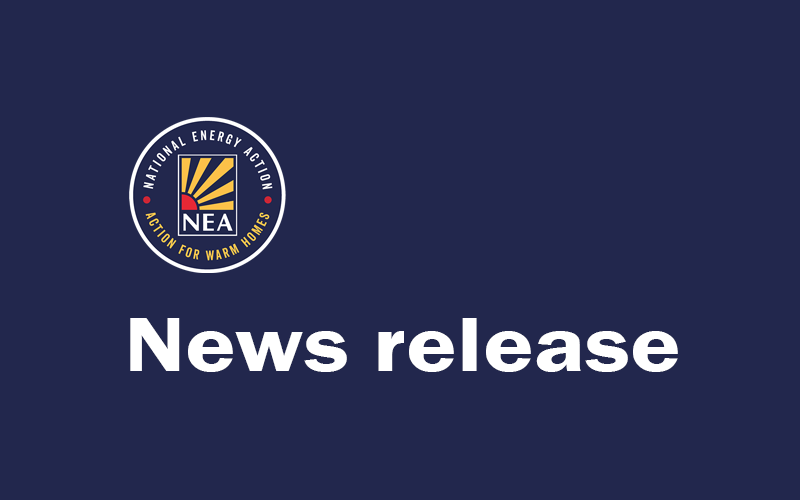- New ONS figures for Excess Winter Deaths in England and Wales reveal 28,300 more deaths last winter
- Charity warns 8,500 deaths due to cold homes – almost 20% higher than the previous winter
- Fears that this winter [2020-21] will be even worse as COVID-19 and cold homes combine with more people spending longer at home, using more energy while earning less
- Hundreds of organisations take part in Fuel Poverty Awareness Day to highlight the risks of cold homes this winter
National fuel poverty charity NEA has today [27 November] highlighted that millions of people in cold homes are at greater risk this winter, as COVID-19 intensifies seasonal stresses for those on lowest incomes and in the least efficient homes.
The charity is speaking out after it was revealed that 8,500 people died in England and Wales last winter due to cold homes. The figures are based on ONS figures released today which highlight that overall, there were 28,300 excess winter deaths, an increase of almost 20% on the previous winter. The warning comes as hundreds of organisations take part in Fuel Poverty Awareness Day to raise awareness of the risks of cold homes this winter.
“Adam Scorer, Chief Executive, NEA comments: “In our last ‘normal’ winter 8,500 lives were lost because of cold homes. Low incomes, high energy costs and poor heating and insulation all combined to leave them in conditions which were unfit to help them survive the cold weather.
“This winter that lethal cocktail will be made many times worse by the impact of COVID-19. Millions of households on low incomes will be spending more time at home with an impossible decision to make.
“Will they keep themselves and their families warm and probably fall into debt; or will they ration their heating and resign themselves to life in a dangerously cold home at greater risk of the very health conditions that follow COVID-19.
“This winter, places of warm refuge, like libraries, cafes and neighbours’ houses will be close by but out of reach.”
During the first wave of COVID-19 NEA put out a call for evidence to organisations supporting people in fuel poverty to understand how the virus and accompanying lockdown had impacted on vulnerable and low-income households. Three quarters said they were concerned that there is a high risk of the increased building up of fuel debt this winter, as a direct result of the pandemic. A new report from the Resolution Foundation has also found that the last 15 years have been the worst on record for real household disposable incomes, and that half (54 per cent) of adults from families in the lowest income quintile have borrowed in recent months to cover everyday costs such as housing and food. This has compounded problems with utility debt.
Scorer continues: “Ultimately, the best solution is a strategic one. To turn cold and dangerous properties into warm and safe homes, easy and cheap to heat. It is well understood that delivering good, warm homes creates jobs, reduces carbon emissions, eases pressures on the NHS as well as allowing people to live better lives.
“But that vital project is for the decades. Fuel poverty will cost lives this winter. Those at risk desperately need an immediate as well as a strategic response. If not the consequences do not bear thinking about.”
On Fuel Poverty Awareness Day, NEA is calling for three actions to help people in fuel poverty this winter:
- Ensuring enough money for essentials: The Universal Credit uplift, which is offering a lifeline to millions by providing extra money for living essentials, must be maintained and strengthened. This will give confidence to people that they can continue to spend what they need over the winter and beyond.
- Bringing forward Breathing Space and new actions to clear debt: halting enforcement action, providing flexibility on repayment plans and introducing new ways to help people with debts will reduce the additional stress caused by falling into household debt.
- Proactive, coordinated and targeted response from frontline agencies making sure that those in need are aware of the help available and supported to action this. National and local government, energy suppliers, network operators, health agencies and other frontline organisations need to proactively identify and assist these customers and clients.
– ENDS –
Contact: Sarah Wright, Head of Communications and Campaigns, NEA, sarah.wright@nea.org.uk / 07884371913
- NEA is the national fuel poverty charity, working to ensure that everyone in England, Wales and Northern Ireland can stay warm and safe at home
- Excess winter mortality statistics record the ‘additional’ deaths that occur in December to March compared to the preceding August to November and Following April to July. Of these the World Health Organisation estimates that 30% are due to cold housing (WHO 2011)
- The EWM statistics for 2019-20 are adjusted to remove the impact of COVID-19 and puts EWM for last winter at 28,300 for England and Wales, 19.6% higher than winter 2018-2019. Further information is available on the ONS website.
- Fuel Poverty Awareness Day is the national day for action against cold homes. It is coordinated by NEA and supported by many others across the UK. For more information visit here.
- Information on NEA’s call for evidence can be found in the 2019-20 Fuel Poverty Monitor
- Resolution Foundation Here today, gone tomorrow.


